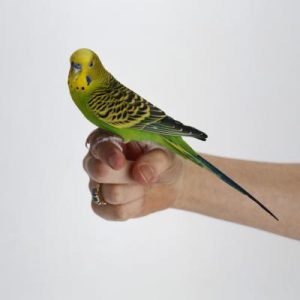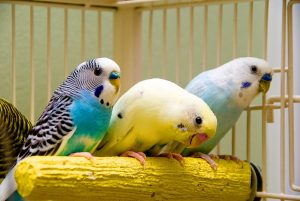Birds
How to Get the Parakeets Bond with You? Practical Tips
Parakeets are known to be intelligent birds. They are quite individualistic in their own right and can be a great pet. They can bond with humans truly well enough and have been observed to be bonding with their owners really well.
Contents
- 1 How to Get the Parakeets Bond with you?
- 2 How To Get A Parakeets To Like You?
- 3 How to Get your Parakeets to Trust you?
- 4 How To Tell If Parakeet Is Happy?
- 5 Do Parakeets Like Music?
- 6 What are the Signs of Stressed Parakeet Behaviour?
- 7 What Are The Signs Of A Lonely Budgie?
- 8 Is It Normal For Parakeets To Scratch?
- 9 How to Calm Parakeets?
- 10 The Closing Thoughts
How to Get the Parakeets Bond with you?
The best way to get the parakeets like you and bond with you would be to feed them from your hand. They would especially love receiving millets from your hand. Once he is ready to accept the food from your hand, you can make them land into your hand, providing your hand or finger as a perch can prove to be handy enough.
How To Get A Parakeets To Like You?
Parakeets are social and can be very friendly. Making them bond with you is relatively easy, but you need to quite patient. If you spend enough time with your parakeet and offer food from your hand, the parakeet will begin bonding with you and learn to trust you.

The right initiative to take would be to ensure that you are not forcing the parakeet to trust or bond with you. The bird will not bond with you right away, but the trick would be to stay patient.
How to Get your Parakeets to Trust you?
Stand near the parakeet cage even when you have not yet been friendly with the bird. Introduce your hand into the cage, but never force yourself. Spend your time around the cage and keep talking to him in a soothing tone. Avoid putting in your hand until he is comfortable. Be patient before he begins to trust you.
Here are the best tips to get the parakeet to trust you:
- Place The Cage In A Family Room:
Place the cage in a family room. But avoid packed rooms with people partying or children yelling. Avoid other pets such as dogs and cats being in the vicinity. Place the cage where people keep moving by, and the bird is not let alone to fend for itself. The parakeet should feel that it is a part of the larger family, but at the same time avoid too much noise.
- Train Your Family :
Train all your family members to understand the needs of the parakeet and what it needs for proper bonding with humans. Avoid making a lot of noise. You should also train your family members to avoid taking him out of the cage unless he has built trust with you.
- Introduce Your Hand:
Once the parakeet has learnt to accept your presence, you can open the door and introduce your hand. Put your hand only a little and let him get a feel of your hand. Do not grab or pet him, but just leave your hand inside for a few moments. Withdraw your hand if he gets agitated. Repeat the process until he is ready. Be patient and do not force yourself ever.
- Offer A Treat:
Offer treats from your hand. This can further let the parakeet learn to trust you. Offering spray millet has been observed to offer a better result. Just put your hand inside the cage with the treat and let him take it from your hand.
- Spend Enough Time Near The Cage:
Spend as much time as possible with the bird near its cage. Keep talking to him smoothly. This will help him learn to accept your presence and develop trust. Making a specific noise just for your parakeet can be one of the great options. Giving him a name and talking to him can be one of the practical options.
- Make Your Hand A Perch:
Once he learns accepting treats from your hand or finger, offer him your hand as a perch. That would further make him trust you. One of the excellent option to make it possible would be to press gently at the bottom of his chest. This can encourage him to jump on your finger.
How To Tell If Parakeet Is Happy?
A few of the indications that can prove that your parakeet is happy can include the signs such as chirping, whistling, singing and mimicking. While the words may not be understandable or coherent, but a mee sign of vocalising is a clear indicator that the parakeet is happy. When happy, they may also sing with you or a song playing on TV.
A few of the signs exhibited by a happy parakeet include :

Do Parakeets Like Music?
Parakeets love music and can even sing along with the music. They may also respond to your music in many different ways. In fact, the parakeets are known to live by the sound. They do need voice or sound for a happy feeling. Make sure you put a piece of soothing music. Yelling and such sounds can make them feel disturbed. Repetitive music can have a better effect. Too louder music can cause stress and anxiety.
What kind of music do parakeets like? Parakeets like serene and smoother music. The music that you put on for a parakeet should always be soothing, quieter and smoother. Loud music is a strict no. Avoid putting the music at a louder volume. The best options would be to put a piece of classical music and smoother new age music.
Some music options for the parakeet that you can explore can include-
- Nature sounds Parakeets love nature and playing the sounds of birds, rain, and similar other options can prove to be a great option. The natural sound can indeed give them a feel of the natural habitat. The sounds of nature can be calming, and it can also provide you with access to a variety of music that you can play.
- Calming Music A very gentle and naturally relaxing experience can be an assured thing with a piece of calming music. In fact, the soothing and calming music can mask the outside the noise. You can even try out meditation music or classical music for achieving the best standard.
- Active Songs Active music such as pop and similar genres can prove to be one of the excellent options. The best part with this kind of music is that it is extremely light and provides you access to a lot of vocals that the parakeets really like. Just ensure that the radio or music device is kept sufficiently far away from the cage.
What are the Signs of Stressed Parakeet Behaviour?
The prime signs that would indicate the stressed parakeet behaviour can include self-mutilation, picking feathers, loss of appetite, repetitive behaviour, fear and anxiety, boredom and changes in the vocalisation.
Stress can definitely play a significant role in the health parameters of your parakeet. Parakeets or any other birds are quite sensitive, and as such, they would not be able to bear the stress as other animals as cats would do.
What are the signs of a stressed parakeet behaviour? A few of the signs that indicate that the parakeet is stressed out can include the following –
What Are The Signs Of A Lonely Budgie?
Budgies and parakeets like to be in groups. They are flock birds, and being social is their prime nature. Once they get used to you as an owner, the members of your family become its flock. They are likely to develop loneliness for a variety of reasons.
The prime signs of a lonely budgie can include:
- The bird may begin picking its feathers. It may also begin self-mutilating itself.
- It will begin losing its interest in food.
- You may notice a change in vocalisation. The budgie can become louder or even tend to go quiet.
- Thee may be a few changes in his droppings. The vet should be in a better position to analyse it.
- He may get irritated for seemingly minor reasons and want to stay alone.

Is It Normal For Parakeets To Scratch?
Mites or parasites may infect a parakeet that scratches itself quite frequently. It can also be due to allergy of some sort in food. If you notice a seemingly healthy parakeet scratching, it can be part of what a stressed parakeet is likely to do. The parakeets in stress usually show the signs of picking one’s feathers or self-mutilating oneself.
How to Calm Parakeets?
The best way to calm a parakeet would be clear the things around the cage that may irritate it, soothing or talking to it, letting him out of the cage and playing with him, provide enough of entertainment options and toys and providing enough space in the cage.
The best option would be to follow the steps here below to calm a stressed parakeet:
The Closing Thoughts
Parakeet emotions are much easy to monitor and understand. You would just need to have enough patience for understanding their body language and other signs of boredom. The tips shared above should ideally help you pick the best possible way to understand parakeet emotions.
Understanding parakeet emotions and dealing with them in the best possible manner can help strengthen the bond between you and your pet bird.

-

 Skunk4 years ago
Skunk4 years agoWhat Does Skunk Poop Look Like? Images & Identifications
-

 Bunny4 years ago
Bunny4 years agoPregnant Rabbit Labor Signs #Test#Symptoms#Age#Length
-

 Turtles4 years ago
Turtles4 years ago8 Basking Rocks/ Platforms for Turtles – A Perfect Guide
-

 Turtles5 years ago
Turtles5 years agoHow To Take Care of Turtle Egg At Home?
-

 Bunny5 years ago
Bunny5 years agoHow to Get Rid of Mites on Rabbits? #NaturalRemedies #Video
-

 Horse4 years ago
Horse4 years agoHow Much Weight Can a Horse Carry? #Clydesdale #Friesian #Mustang #Draft
-

 Turtles4 years ago
Turtles4 years agoHow to Take Care of Snapping Turtle Eggs? #Incubating #Hatching
-

 Bunny5 years ago
Bunny5 years agoHow to Potty Train a Rabbit in House? Tips on Litter Training











